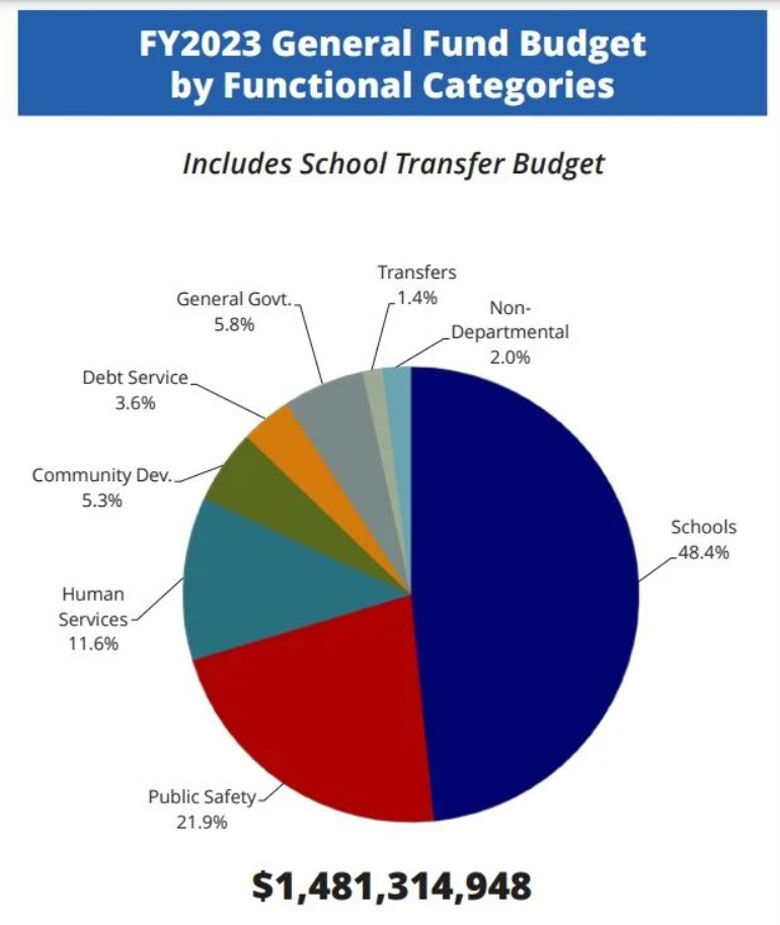This article was written by WTOP’s news partner InsideNoVa.com and republished with permission. Sign up for InsideNoVa.com’s free email subscription today.
Prince William County has all but approved its budget for the upcoming fiscal year, with supervisors advancing a spending plan that will have the average county homeowner paying a slightly higher tax bill.
The Board of Supervisors on Tuesday held its final work session on the proposed $1.48 billion budget for fiscal 2023, which starts July 1.

The proposal is an increase of $127 million, or 9.4%, over the budget for the current fiscal year and comes with a $1.15 billion six-year Capital Improvement Program, with $334.8 million earmarked for the upcoming budget year.
Last week, county officials proposed a further reduction in the real estate tax rate from $1.115 per $100 of assessed value to $1.03. The original proposal dropped the rate to $1.05.
While the rate is dropping, rising property values will result in an effective tax increase. Under the initial proposal, the average residential tax bill would increase $266, or 5.7%, on a home valued at $469,842, the median home value in the county. With the further reduction of the real estate tax rate, bills would still rise $172 on a home of the same value.
The rate would need to be lowered to $1 per $100 of assessed value to avoid an effective tax increase. Supervisors reduced the real estate tax rate in the current fiscal year from $1.125 per $100 of assessed value to $1.115, but homeowners still saw an average increase of about $264.
The county also plans to adopt a new 4% tax on prepared meals, such as those served at restaurants, which would generate $24.5 million.
Meanwhile, officials also proposed assessing vehicles at 80% of their estimated value for personal property tax bills to combat unusual increases in used car values. The change won’t wipe out all bill increases but is expected to lessen the impact.
The board spent about 90 minutes discussing potential changes to the plan proposed by Republicans on Tuesday before each measure was turned away by the Democratic majority.
Supervisor Yesli Vega, R-Coles, proposed reducing the real estate tax rate to 96 cents per $100 of assessed value and eliminating the meals tax. She recommended covering the revenue differences by eliminating 60% of all new planned employee positions, removing funding for collective bargaining and eliminating the Office of Diversity, Equity and Inclusion.
“People are getting kicked in the teeth with record inflation,” she said.
Supervisor Jeanine Lawson, R-Brentsville, proposed eliminating all new proposed positions because the county has an extensive list of vacancies across several departments.
“We’re having a year of progress when it comes to commercial and residential growth,” she said. “But families are struggling. They’re struggling every time they go to the grocery store, gas tank, ordering online.”
Lawson’s first proposal to reduce the budget that received a vote was to eliminate 16 planned civilian positions in the police department. The positions were proposed to free up sworn officer positions from desk duties.
“It’s one way to increase the number of people we have out on the street without hiring a new officer,” said Police Chief Peter Newsham.
Newsham said the department has vacancies of 68 sworn officers, 15 administrative staff and 16 crossing guards.
Lawson said the county needs to fill vacancies before adding new positions.
“Look, I love your department,” she told Newsham. “I do not like doing this. But I think we need to focus on these savings.”
The board conducted a poll of the proposal, and Lawson was the only one in favor of cutting the police department positions. However, across the board, supervisors felt it was important to figure out why so many funded positions are sitting vacant.
“At some point we have to stop this Ferris wheel we’re on,” said Supervisor Pete Candland, R-Gainesville. “This is not going to change unless we as a board at the very beginning of the budget process tell our county staff this is not acceptable.”
The board also took a poll on removing collective bargaining from the budget, which failed 3-5 on a party-line vote in favor of Democrats.
A poll to remove the Office of Diversity, Equity and Inclusion failed on a 2-6 vote. Candland joined Democrats in opposition, saying the board should fully review the department before eliminating it.
The board took a final poll on keeping the budget at what was proposed last week, with Democrats in the majority at 5-3.
The budget is scheduled for adoption April 26.







